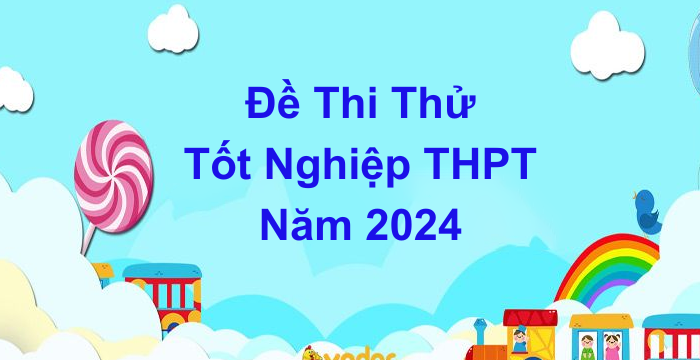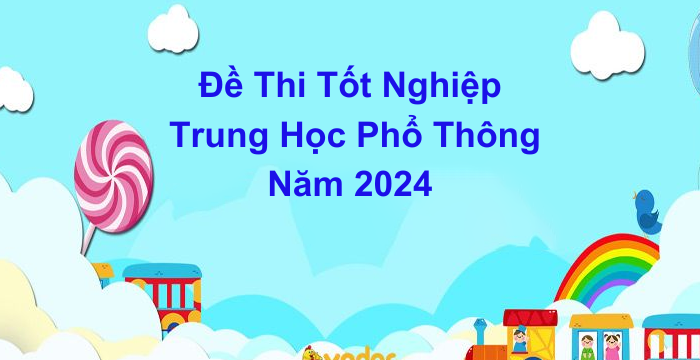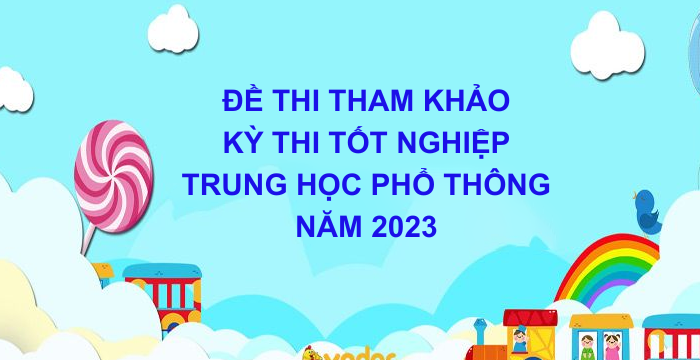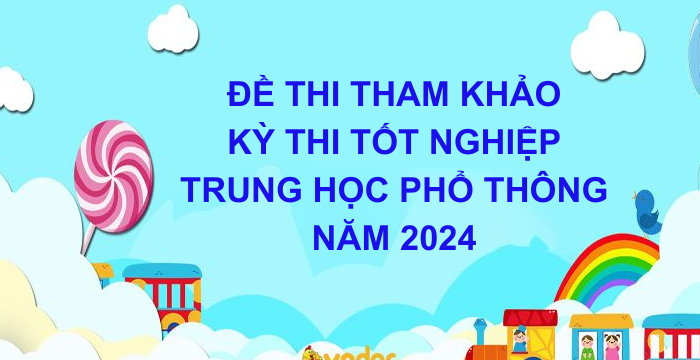Đề Thi Thử Tốt Nghiệp THPT Năm 2024 (20.05.2024) Đề 8
Thầy Thắng
ĐỀ THI THPT
15
Ngày đăng: 20-05-2024 10:51:11

ĐỀ 8 ĐỀ THAM KHẢO PHÁT TRIỂN MINH HỌA BGD 2024
KỲ THI TỐT NGHIỆP TRUNG HỌC PHỔ THÔNG NĂM 2024
Bài thi: NGOẠI NGỮ; Môn thi: TIẾNG ANH
Thời gian làm bài: 60 phút không kể thời gian phát đề
Mark the letter A, B, C, or D on your answer sheet to indicate the word whose underlined part differs from the other three in pronunciation in each of the following questions.
Question 1. A. bread B. heat C. peak D. steal
Question 2. A. curriculum B. coincide C. currency D. conception
Mark the letter A, B, C, or D on your answer sheet to indicate the word that differs from the other three in the position of primary stress in each of the following questions.
Question 3. A. support B. slogan C. icon D. motto
Question 4. A. dominate B. disagree C. disrespect D. interfere
Mark the letter A, B, C, or D on your answer sheet to indicate the correct answer to each of the following questions.
Question 5. Perhaps the_________place to grow up is the place where you feel at home.
A. most good B. better C. best D. more good
Question 6. He likes Ha Long Bay best because the scenery there is so _______.
A. beautify B. beautiful C. beauty D. beautifully
Question 7._______contaminated water from a nearby river, lots of people in this village suffer from cancers.
A. Drinking B. having drunk C. drank D. Drunk
Question 8. What did you have for________ breakfast this morning?
A. x B. a C. an D. the
Question 9. It's a long walk tomorrow. We need to____________as early as possible.
A. set up B. set in C. set off D. set about
Question 10: These flowers _______ every day.
A. water B. are watered C. are watering D. have watered
Question 11: We regret________the cancellation of flight BA205 to Madrid.
A. announcing B. announce C. to announce D. announced
Question 12: Neither of the boys came to school yesterday, ________?
A. didn’t they B. does they C. did they D. doesn’t they
Question 13: The children are highly excited________the coming summer holiday.
A. with B. about C. to D. for
Question 14. The storm did a lot of ________to our village. All the crops were drastically destroyed and many houses were washed away.
A. injury B. hardship C. harm D. damage
Question 15. When the boss walked into the office, his secretary ________.
A. has been typing B.was typing C. is typing D. had typed
Question 16: He decided to withdraw from the powerboat race as he had a (n) ________ of danger.
A. omen B. premonition C. foreboding D. prediction
Question 17._______, she will buy her parents a new TV.
A. When she receives her salary B. Once she received her salary
C. Until she received her salary D. After she had received her salary
Question 18: I’ve _______ an appointment with Dr. Evans to have a check-up.
A. went B. put C. lent D. made
Question 19: Mr Nam knows Hanoi City like the back of his____________. He used to be a taxi driver there for 10 years.
A. head B. mind C. hand D. life
Mark the letter A, B, C, or D on your answer sheet to indicate the option that best completes each of the following exchanges.
Question 20: Janet wants to invite Susan to go to the cinema.
- Janet: “Do you feel like going to the cinema this evening?” - Susan: “______.”
A. I don’t agree, I’m afraid B. You’re welcome
C. That would be great D. I feel very bored
Question 21: - Baker: “In my opinion, women often drive more carefully than men.”
- Barbara: “______.”
A. Never mind B. What nonsense C. Absolutely D. Yes, please
Mark the letter A, B, C or D to indicate the word(s) OPPOSITE in meaning to the underlined word(s) in each of the following questions.
Question 22. His physical condition was not an impediment to his career as a violinist. He has won a lot of prizes.
A. advantage B. obstacle C. barrier D. disadvantage
Question 23. Tom may get into hot water when driving at full speed after drinking wine.
A. get into trouble B. stay safe C. fall into disuse D. keep calm
Mark the letter A, B, C or D to indicate the word(s) CLOSEST in meaning to the underlined word(s) in each of the following questions.
Question 24. Emissions from factories and exhaust fumes from vehicles can have detrimental effects on our health.
A. beneficial B. neutral C. needy D. harmful
Question 25. By being thrifty and shopping wisely, housewives in the city can feed an entire family on as little as 500.000 VND a week.
A. luxurious B. economical C. sensible D. miserable
Mark the letter A, B, C or D on your answer sheet to indicate the sentence that is closest in meaning to each of the following questions
Question 26. You’re not required to fill in this form.
A. You shouldn’t fill in this form. B. You mustn’t fill in this form.
C. You needn’t fill in this form. D. You can’t fill in this form.
Question 27. It is over twenty years since I last got in touch with them.
A. I can’t help keeping getting in touch with them for over 20 years.
B. I haven’t gotten in touch with them for over 20 years.
C. I used to get in touch with them for over 20 years.
D. I have been getting in touch with them for over 20 years.
Question 28. She said, ”John, I'll show you round my city when you're here.”
A. She made a trip round her city with John. B. She planned to show John round her city.
C. She promised to show John round her city. D. She organized a trip round her city for John.
Mark the letter A, B, C, or D on your answer sheet to indicate the underlined part that needs correction in each of the following questions.
Question 29: Not Scotland again! It rains every day last time. I want to go somewhere sunny this summer.
A. Not B. rains C. somewhere D. sunny
Question 30: Because it does not have a blood supply, the cornea takes their oxygen directly from the air.
A. have B. supply C. their D. directly
Question 31: This is an exhausting list of grammar rules you will need to know for the exam.
A. exhausting B. rules C. to know D. the
Mark the letter A, B, C, or D on your answer sheet to indicate the sentence that best combines each pair of sentences in the following questions
Question 32: We couldn't see the mountains because of the rain.
A. If only it didn't rain so we can see the mountains.
B. If it hadn't rained, we could have seen the mountains.
C. If it had rained, we couldn’t have seen the mountains.
D. Provided it rains, I could see the mountains.
Question 33: When we crossed the fields, we saw a tiny house at the foot of the mountain.
A. No sooner had we crossed the fields when we saw a tiny house at the foot of the mountain.
B. Not until we crossed the fields did we see a tiny house at the foot of the mountain.
C. Scarcely had we crossed the fields than we saw a tiny house at the foot of the mountain.
D. It was not until we crossed the fields did we see a tiny house at the foot of the mountain.
Read the following passage and mark the letter A, B, C, or D on your answer sheet to indicate the correct word or phrase that best fits each of the numbered blanks from 34 to 38.
The knock-on effect of volunteering on the lives of individuals can be profound. Voluntary work helps foster independence and imparts the ability to deal with different situations, often simultaneously, thus teaching people how to (34) ________ their way through different systems. It therefore brings people into touch with the real world; and, hence, equips them for the future.
Initially, young adults in their late teens might not seem to have the expertise or knowledge to impart to others that say a teacher or agriculturalist or nurse would have, (35) ________ they do have many skills that can help others. And in the absence of any particular talent, their energy and enthusiasm can be harnessed for the benefit of their fellow human beings, and ultimately themselves. From (36) ________this, the gain to any community no matter how many volunteers are involved is (37) ________.
Employers will generally look favorably on people (38) ________ have shown an ability to work as part of a team. It demonstrates a willingness to learn and an independent spirit, which would be desirable qualities in any employee.
Question 34. A. give B. work C. put D. take
Question 35. A. so B. but C. or D. for
Question 36. A. all B. none C.above D. both
Question 37. A. unattainable B. immeasurable C. undetectable D. impassible
Question 38. A. which B. whose C. who D. what
Read the following passage and mark the letter A, B, C, or D on your answer sheet to indicate the correct answer to each of the questions from 39 to 43.
Culture is the lens with which we evaluate everything around us; we evaluate what is proper or improper, normal or abnormal, through our culture. If we are immersed in a culture that is unlike our own, we may experience culture shock and become disoriented when we come into contact with a fundamentally different culture. People naturally use their own culture as the standard to judge other cultures; however, having our own judgment could lead us to discriminate other cultural values which are different from our own because we do not understand them.
Cultural diversity is important because our country, workplaces, and school increasingly consist of various cultural, racial, and ethnic groups. We can learn from one another, but first we must have a level of understanding about each other in order to facilitate collaboration and cooperation. Learning about other cultures helps us understand different perspectives within the world in which we live and helps dispel negative stereotypes and personal biases about different groups.
In addition, cultural diversity helps us recognize and respect “ways of being” that are not necessarily our own, so that we interact with others, we can build bridges to trust, respect, and understanding across cultures. Furthermore, this diversity makes our country a more interesting place to live, as people from diverse cultures contribute language skills, new ways of thinking, new knowledge, and different experiences.
(Adapted from https://www.purdueglobal.edu/)
Question 39: Which could be the best title for the passage?
A. How can we learn from culture? B. What is the function of culture?
C. How do people use own culture? D. Why is cultural diversity a “good thing”?
Question 40: The word “which” in paragraph 1 refers to ________
A. cultural values B. other cultures C. judgment D. standard
Question 41: Which of the following is TRUE about the main reason for discrimination?
A. Making judgment B. Immersed in a culture
C. Valuating everything D. Contacting with a different culture
Question 42: The word “dispel” in paragraph 2 mostly means ________
A. realize B. remove C. contain D. discuss
Question 43: According to the passage, which of the following do people from diverse cultures NOT contribute to a country?
A. new ways of thinking B. a more interesting place
C. language skills D. different experiences
Read the following passage and mark the letter A, B, C, or D on your answer sheet to indicate the correct answer to each of the questions from 44 to 50
If you go back far enough, everything lived in the sea. At various points in evolutionary history, enterprising individuals within many different animal groups moved out onto the land, sometimes even to the most parched deserts, taking their own private seawater with them in blood and cellular fluids. In addition to the reptiles, birds, mammals and insects which we see all around us, other groups that have succeeded out of water include scorpions, snails, crustaceans such as woodlice and land crabs, millipedes and centipedes, spiders and various worms. And we mustn’t forget the plants, without whose prior invasion of the land, none of the other migrations could have happened.
Moving from water to land involved a major redesign of every aspect of life, including breathing and reproduction. Nevertheless, a good number of thoroughgoing land animals later turned around, abandoned their hard-earned terrestrial re-tooling, and returned to the water again. Seals have only gone part way back. They show us what the intermediates might have been like, on the way to extreme cases such as whales and dugongs. Whales (including the small whales we call dolphins) and dugongs, with their close cousins, the manatees, ceased to be land creatures altogether and reverted to the full marine habits of their remote ancestors. They don’t even come ashore to breed. They do, however, still breathe air, having never developed anything equivalent to the gills of their earlier marine incarnation. Turtles went back to the sea a very long time ago and, like all vertebrate returnees to the water, they breathe air. However, they are, in one respect, less fully given back to the water than whales or dugongs, for turtles still lay their eggs on beaches.
There is evidence that all modem turtles are descended from a terrestrial ancestor which lived before most of the dinosaurs. There are two key fossils called Proganochelys quenstedti and Palaeochersis talampayensis dating from early dinosaur times, which appear to be close to the ancestry of all modem turtles and tortoise. You might wonder how we can tell whether fossil animals lived in land or in water, especially if only fragments are found. Sometimes it’s obvious. Ichthyosaurs were reptilian contemporaries of the dinosaurs, with fins and streamlined bodies. The fossils look like dolphins and they surely lived like dolphins, in the water. With turtles it is a little less obvious. One way to tell is by measuring the bones of their forelimbs.
Question 44: Which of the following best serves as the main idea for the passage?
A. The relationship between terrestrial species and marine creatures.
B. The reasons why species had to change their living place.
C. The evidences of the time marine animals moved to land.
D. The evolution of marine species in changing places to live.
Question 45: As mentioned in paragraph 2, which of the following species returned to the water least completely?
A. Manatees B. Whales C. Dugongs D. Turtles
Question 46: The word “ceased” in paragraph 2 mostly means _______.
A. got familiar B. soon became
C. stopped happening or existing D. began to happen or exist
Question 47: The word “incarnation” in paragraph 2 could be best replaced by _______.
A. evolution B. ancestor C. natural selection D. embodiment
Question 48: According to the passage, which of the following is NOT true?
A. Apart from breathing and breeding, marine species were expected to change nothing to live on land.
B. Seals are able to live on land and in the water.
C. Some terrestrial habits were remained when the species reverted to water life.
D. Proganochelys quenstedti and Palaeochersis talampayensis appear to be close to the ancestry of all modern turtles and tortoise.
Question 49: What does the word “they” in the last paragraph refer to?
A. dolphins B. fragments C. ichthyosaurs D. turtles
Question 50: It can be inferred from the passage that _______.
A. it’s clear to determine the living places of all species through the fragments found
B. the body features of the fossil animals help scientists to distinguish the terrestrial and marine species
C. turtles’ ancestor and dinosaurs became extinct contemporarily
D. the fossils of turtles and tortoises might have the similar appearances with dolphins
—THE END—
Giải đáp mọi thắc mắc trong đề - mua bản word và đáp án vui lòng liên hệ Zalo: 034 8371 758
Theo dõi fanpage để cập nhật nhanh các bài tập và đề kiểm tra mới nhất.
https://www.facebook.com/profile.php?id=61555984765050
Bài Viết Liên Quan

Đề Thi Thử Tốt Nghiệp THPT 2025 (27.05.2025)

Đề Thi Thử Tốt Nghiệp THPT 2025 (03.04.2025)

Đề Thi Thử Tốt Nghiệp THPT 2025 (02.04.2025)

Đề Thi Tốt Nghiệp THPT Năm 2024

Đề Thi Thử Tốt Nghiệp THPT Năm 2024 (29.05.2024) Đề 19

Đề Thi Thử Tốt Nghiệp THPT Năm 2024 (28.05.2024) Đề 18

Đề Thi Thử Tốt Nghiệp THPT Năm 2024 (27.05.2024) Đề 17

Đề Thi Thử Tốt Nghiệp THPT Năm 2024 (25.05.2024) Đề 16

Đề Thi Thử Tốt Nghiệp THPT Năm 2024 (24.05.2024) Đề 15

Đề Thi Thử Tốt Nghiệp THPT Năm 2024 (24.05.2024) Đề 14

Đề Thi Thử Tốt Nghiệp THPT Năm 2024 (23.05.2024) Đề 13

Đề Thi Thử Tốt Nghiệp THPT Năm 2024 (23.05.2024) Đề 12

Đề Thi Thử Tốt Nghiệp THPT Năm 2024 (22.05.2024) Đề 11

Đề Thi Thử Tốt Nghiệp THPT Năm 2024 (22.05.2024) Đề 10

Đề Thi Thử Tốt Nghiệp THPT Năm 2024 (20.05.2024) Đề 9

Đề Thi Thử Tốt Nghiệp THPT Năm 2024 (17.05.2024) Đề 7

Đề Thi Thử Tốt Nghiệp THPT Năm 2024 (16.05.2024) Đề 6

Đề Thi Thử Tốt Nghiệp THPT Năm 2024 (15.05.2024) Đề 5

Đề Thi Thử Tốt Nghiệp THPT Năm 2024 (09.05.2024) Đề 4

Đề Thi Thử Tốt Nghiệp THPT Năm 2024 (08.05.2024) Đề 3

Đề Thi Thử Tốt Nghiệp THPT Năm 2024 (05.05.2024) Đề 2

Đề Thi Thử Tốt Nghiệp THPT Năm 2024 (03.05.2024) Đề 1

Đề Thi Thử Tốt Nghiệp THPT Năm 2024 (09.04.2024)

ĐỀ THI THAM KHẢO KỲ THI TỐT NGHIỆP TRUNG HỌC PHỔ THÔNG NĂM 2023 (05.04.2024)

Đề Thi Thử Tốt Nghiệp THPT Năm 2024 (05.04.2024)

Đề Thi Thử Tốt Nghiệp THPT Năm 2024 (1.04.2024)

Đề Thi Thử Tốt Nghiệp THPT Năm 2024 (1.04.2024)

ĐỀ THI THAM KHẢO KỲ THI TỐT NGHIỆP TRUNG HỌC PHỔ THÔNG NĂM 2024 (22.03.2024)

Đề Thi Thử Tốt Nghiệp THPT Năm 2024 (15.03.2024)

Bài Đăng Gần Đây

Đề Cương Ôn Tập Giữa Học Kì 2 Tiếng Anh Lớp 7 Global Success (24.02.2026)

Đề Kiểm Tra Giữa Kì 2 Tiếng Anh Lớp 7 Global Success (3.2.2026)

Đề Kiểm Tra Cuối Kì 1 Tiếng Anh Lớp 10 Global Success (02.01.2026)

Đề Cương Ôn Tập Cuối Học Kì 1 Tiếng Anh Lớp 8 Global Success (30.12.2025)

